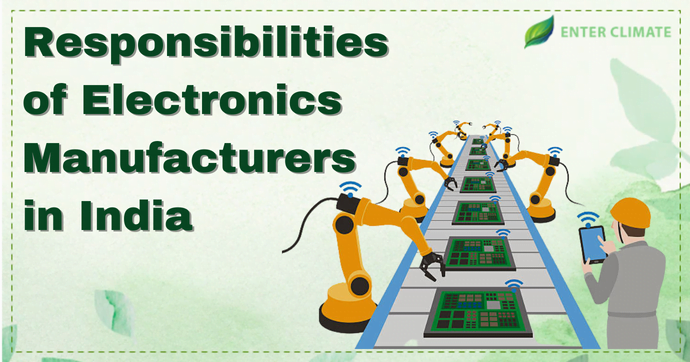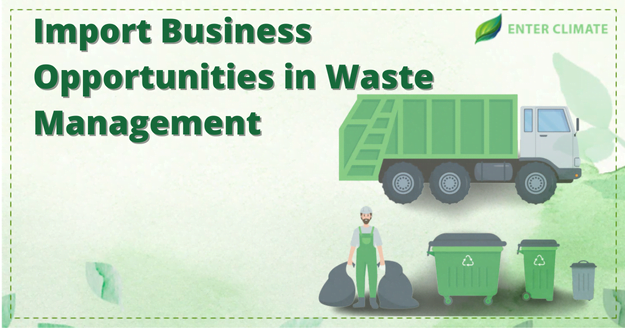Responsibilities of Electronics Manufacturers in India
 11 Oct, 2022
11 Oct, 2022 
The polluter Pays Principle (PPP) forms a basis for Extended Producers Responsibility (EPR), with more stress on the life-cycle impact of the products. In the last few years, the authorities have levied responsibility on the producers of these goods and for their end-of-life management, including waste management. The responsibilities of electronics manufacturers in India allow them to delegate this responsibility to a third party, the producer Responsibility Organisation (PRO). The producer pays the fee for the same for used product management.
With the increase in the use of technology and the influx of electronic products in the country, Electronics manufacturers in Indiaoccupy the most significant portion of revenue in the nation. But with increased development, India is also becoming the hub of e-waste. Consequently, while implementing the laws, the Government of India has stipulated various responsibilities for the manufacturers.
The responsibilities of Electronics manufacturers in India are segregated into three parts: pre-registration responsibilities, responsibilities during registration and post-registration responsibilities.
Pre-registration responsibilities of Electronics Manufacturers in India
For setting up any manufacturing unit involving EEE (Electrical and Electronic Equipment), one has to attain an Extended Producers Responsibility (EPR) Certificate, for which some conditions are needed to be satisfied: –
- Before setting up any plant or unit, the producer has to ensure an adequate area and place for conducting operations and for employees to work comfortably.
- Responsibilities of Electronics Manufacturers in India include forming a negotiated contract with the Treatment, Storage and Disposal Facility (TSDF) operator.
- The producers are also mandated to obtain some licenses, including ISO Certificate, Consent to Establish and Consent to Operate from Pollution Control Board/State Pollution Control Board (SPCB) and GST Registration.
Responsibility of Electronics Manufacturers in India under EPR Registration
Under the E-Waste Management Rules provision (Rule 5), the responsibilities of Electronics Manufacturers in India are defined as: –
- First and foremost, the responsibility of electronics manufacturers in India includes applying for authorisation from the SPCB in Form 1(a).SPCB issues authorisation in Form 1(bb).
Documents needed to register for Extended Producer Responsibility are as follows –
- Aadhaar card
- Legal documents of the manufacturer
- CIN (Certificate of Incorporation), depending upon the nature of the enterprise
- Import Export Code (if applicable)
- MOA (Memorandum of Association)
- AOA (Articles of Association)
- Contact details
- Copy of PAN card
- Particulars of the authorised person signing the documents
- Authorisation by municipal corporations or local bodies (if applicable)
- Specifics of the products containing model numbers and import history
- Copy of BIS License (if applicable)
- Details of RoHS (Reduction of Hazardous Wastes) compliance
- Estimation of E-waste collected or managed
- The projected budget for the Electronic Producer Responsibility (EPR)
- Specifics of the awareness programme to make folks aware of the waste management
- Extended producer responsibility Action Plan
- Agreement copy with the collection centres, dealers, recyclers, storage and disposal
- Website content specifying the obligation towards e-waste management
- Providing information regarding proper implementation of the Deposit Refund Scheme to ensure the product is collected and channelised to an authorised dismantler or recycler.
- The responsibilities of electronics manufacturers in India also include maintaining data for records on e-waste handled or produced that is to be submitted to Central Pollution Control Board (CPCB).
- EEE (Electrical and Electronic Equipment) will only be imported after obtaining EPR registration.
- Execution of the EPR plan affirming the procedure of collection and channelisation of WEEE, its treatment and dumping methods, programs on public awareness, instructions for handling/disposal of equipment after use, the composition of the hazardous elements therein, etc.
- Public awareness has to be spread on: –
- EEE (Electrical and Electronic Equipment) constituents which are hazardous
- Hazards of improper management include handling, disposal, accidental breakage, damage or improper recycling of e-waste
- Guidelines on handling and disposal of e-waste
- Details on helpline number, website, address and e-mail address
- Information on Deposit Refund Scheme and other resources available to return e-waste
- When disposing at TSDF (Treatment, Storage and Disposal Facility), proper treatment must be done to disable mercury and reduce the volume of waste.
Post-registration responsibilities of electronics manufacturers in India
The post-registration responsibilities of electronics manufacturers in India under EPR are categorised into two parts: –
- As per E-waste Management Rules, 2016, the PIBOsmust submit their half-yearly report concerning the progress of e-waste management for every state and union territory stated in the EPR Plan. This has to be submitted to the particular SPCB/PCC. Moreover, the PIBOs must furnish supporting papers and documentary proof from the processing facility.
- The annual report is submitted by the PIBOs every year by 30th April to Central Pollution Control Board.
- As per E-waste Management Rules, 2016[1], the PIBOsalso have to submit the sales details to the SPCB/PCC.
Conclusion
Extended Producer Responsibility is a complicated process which poses several challenges for electronics manufacturers. Responsibilities of electronics manufacturers in India include three central liabilities: economic, physical and informative responsibilities mandated by guidelines provided by CPCB.
Read our Article: MSTC E-waste Auction: The detailed procedure












